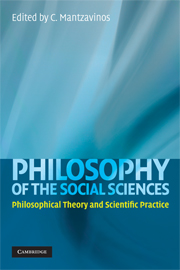Book contents
- Frontmatter
- Contents
- List of Contributors
- Acknowledgements
- Introduction
- Part I Basic Problems of Sociality
- Part II Laws and Explanation in the Social Sciences
- 4 Physicalism and the Human Sciences
- Comment
- 5 Complexity and Explanation in the Social Sciences
- Comment
- 6 The Heterogeneous Social: New Thinking About the Foundations of the Social Sciences
- Comment
- 7 What Is This Thing Called “Efficacy”?
- Comment
- Part III How Philosophy and the Social Sciences Can Enrich Each Other: Three Examples
- Epilogue
- Name Index
- Subject Index
- References
Comment
Conditional Knowledge: An Oxymoron?
Published online by Cambridge University Press: 05 June 2012
- Frontmatter
- Contents
- List of Contributors
- Acknowledgements
- Introduction
- Part I Basic Problems of Sociality
- Part II Laws and Explanation in the Social Sciences
- 4 Physicalism and the Human Sciences
- Comment
- 5 Complexity and Explanation in the Social Sciences
- Comment
- 6 The Heterogeneous Social: New Thinking About the Foundations of the Social Sciences
- Comment
- 7 What Is This Thing Called “Efficacy”?
- Comment
- Part III How Philosophy and the Social Sciences Can Enrich Each Other: Three Examples
- Epilogue
- Name Index
- Subject Index
- References
Summary
Sandra Mitchell's program to keep the “science” in “social science” emphasizes that explanation – answering the question “Why?” – is the job of science. For her, the main question facing social science is “How do we detect and describe the causal structure of complex, highly contingent, interactive systems and how do we export that knowledge to other similar systems?” in order to “explain, predict, and successfully intervene in the world” when it is inevitably the case that “The general truths we discover about the world vary with respect to their degree of contingency on the conditions upon which the relationships described depend.” I think it matters whether they are more or less general or more or less true, but in any case she argues that “The important question is how less than universal, exceptionless generalizations can do the jobs of science, since it is clearly not simply by means of generalization from one or a few instances and instantiation to all regions of space and time.” That gives us an enormous amount to think about. I will de-emphasize interactions, predictions, and interventions, and focus mostly on how clearly Mitchell's arguments bring out some important points about the role in political science explanations of “causal” effects, complexity, and models.
Partly because political scientists train in a range of traditions like economics, journalism, philosophy, psychology, or sociology, the field of political science is not defined by any agreement on which is the best method of inference and so methodological diversity runs deep.
- Type
- Chapter
- Information
- Philosophy of the Social SciencesPhilosophical Theory and Scientific Practice, pp. 146 - 153Publisher: Cambridge University PressPrint publication year: 2009



